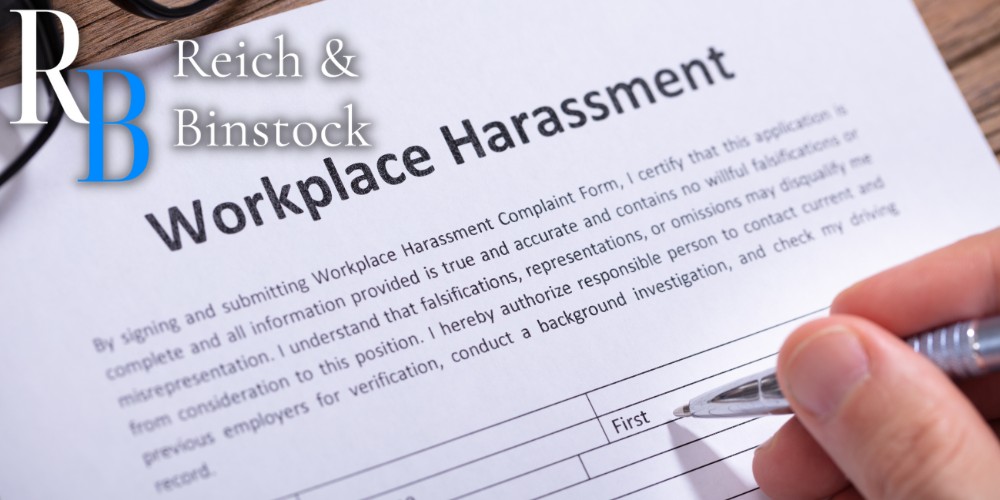Unfortunately, workplace sexual harassment is nothing new. There can be many questions about the recourse for sexual harassment. If you were sexually harassed or if you suffered unwanted sexual advances, you can sue for sexual harassment in the workplace. Employers and businesses have a duty to prevent workplace sexual harassment. Unfortunately, many sexual harassment cases are swept under the rug. Call a Houston sexual assault attorney at Reich & Binstock today to see where you need to begin in your sexual harassment claim.
What to Know About Sexual Harassment at Work

It is unlawful, under federal law, to harass a person because of that person’s sex. Harassment can include many acts or statements, and even unwelcome sexual advances. Other examples of illegal sexual harassment include requests for sexual favors, sexual violence, and other verbal or physical harassment of a sexual nature.
What Is Considered Sexual Harassment?
Sexual harassment is considered to be any sexually suggestive acts in the workplace that can make a person feel uncomfortable. Workplace sexual harassment includes sexual jokes, making fun of someone’s gender identity, quid pro quo harassment, or even physical assault. Many different parties can commit sexual harassment, including co-workers, employers, supervisors and others. Sexual harassment does not require physical contact, nor does it have to be directed at a specific person. Additionally, anyone can experience sexual harassment from another person. People of the opposite or the same sex as the abuser can be harassment victims.
Some of the behaviors that are considered sexual harassment at the workplace include:
- Physical acts of sexual assault
- Requests for sexual favors (Quid Pro Quo)
- Verbal harassment that is sexual in nature (unwarranted comments about your sexual orientation or sexual acts)
- Jokes that make fun of someone’s sexual or gender identity
- Unwanted physical advances or unwanted touching
- Talking about sexual fantasies or past sexual events
- Sending explicit sexual photos, videos, texts, or emails
- Whistling or catcalling
Sexual Harassment vs Sexual Assault
The difference between sexual harassment and sexual assault is that sexual harassment does not require a physical element. By definition, assault is a crime in which someone threatens or attempts to inflict physical or bodily harm on another person.
Sexual harassment is a broad term, including unwelcome verbal and physical sexual attention. You can be harassed without ever being touched by anyone, and you can file a sexual harassment case. Any comment, joke, or behavior that refers to sexual content is considered harassment.
Sexual assault refers to sexual contact or behavior, predominately physical, that occurs without your consent. Sexual assault is usually a criminal act. Some forms of sexual assault include:
- Penetration of your body, also known as rape
- Attempted rape
- Forcing you to perform sexual acts, such as oral sex or penetration of the offender’s body
- Fondling or unwanted sexual touching
How to File a Claim for Sexual Harassment at Work

If your company of employment has under 15 employees, you must file with the TWCCRD. If your company has at least 15 employees, you can choose to file with either the EEOC or TWCCRD. However, before you can go to court, you have to complain to the appropriate agency in a timely manner.
You do not have to have a lawyer to file with the EEOC or TWCCRD. However, you do have to file a written complaint with the EEOC or TWCCRD and sign it by the deadline.
Follow Your Company’s Guidelines
Most large companies have an employee handbook that is detailed and outlines everything in relation to human resources and procedures, including handling sexual harassment claims.
A company’s sexual harassment policy will typically include what the company considers sexual harassment, how to report the incident, how much time you have to report it, how the investigation will proceed, the penalties for the offenders, and support available for the victim.
It is important that you read through your company’s policy as quickly as possible after your hire so that you know what the procedure looks like before anything happens.
Report the Harassment to Human Resources
Chances are that your Human Resources department is the designated department to handle sexual harassment claims. If your company is small and you don’t have a Human Resources department, you may have to report the issue to your supervisor or to a higher-up in the company that you believe you can trust. However, if your supervisor is the person committing the harassment, you should go to whoever is above them, such as the owner or main person in charge.
Keep Detailed Records of the Harassment
Writing down details of your harassment incident may be challenging because it can bring back negative feelings about the incident. However, it is extremely important to have all the details written down, as your company’s human resources department or your sexual harassment attorney will need them for your claim.
We recommend keeping the following details of how you were sexually harassed.
- When, where, and at what time the harassment occurred
- Name of the person who harassed you
- Names of any witnesses to the incident
- What happened during the incident
- Name of anyone who talked to you about the incident and when they spoke about it
- Actions taken or statements made by management
Report the Harassment to the EEOC
If you have done all of the above steps and the harassment continues, then it is time to take further action outside your workplace. You can file a formal complaint with a government agency known as the Equal Employment Opportunity Commission (EEOC) or the Texas Workforce Commission Civil Rights Division (TWCCRD). This way, you will not only have the incident documented at work, but you’ll also have evidence from a government agency.
Contact a Sexual Abuse Lawyer
If you have experienced sexual harassment in the workplace, contact an experienced sexual harassment attorney at Reich & Binstock LLP. Our attorneys will work with you every step of the way to make sure you are awarded the best possible compensation for your sexual harassment claim. We understand that experiencing sexual harassment can change your life in many ways. That’s why we will give you the support and the strength you need from the beginning of your case to the end, as well as walk you through the process of how to sue a company. You deserve financial compensation for the abuse and inappropriate behavior you suffered.
Types of Sexual Harassment Claims in the Workplace
The most common types of workplace sexual harassment, according to the Equal Employment Opportunity Commission (EEOC), include Quid Pro Quo harassment and hostile work environments. Quid pro quo harassment generally involves one party seeking a sexual favor in exchange for some kind of employee benefit, such as a promotion. A hostile work environment can come about if the illegal harassment is so severe that it impairs your ability to do your job. The EEOC provides guidance on defining sexual harassment and establishing employer liability.
The EEOC says sexual harassment can occur in a variety of circumstances, including the following:
- Victims can be any gender, including both men and women. They can also be either the same sex or the opposite sex as the abuser.
- An abuser could be anyone, including bosses, supervisors, coworkers, and even non-employees.
- In order to be a victim, it is not always necessary that they be the direct target of harassment. Anyone who was affected in some way by the offensive work environment can also be a victim.
- The conduct of the abuser must be unwelcome in order to constitute a sexual harassment lawsuit.
Quid Pro Quo
This simply means “this for that.” Involving expressed or implied demands for sexual favors in exchange for some benefit, such as a promotion or pay increase, or to avoid detriment, such as termination of employment or demotion, in the workplace.
Quid Pro Quo offenders are most commonly someone who is in a position of power over another person, including a manager or supervisor. For example, a supervisor threatens to fire an employee if he or she does not grant a sexual favor.
Hostile Work Environment
Hostile work environment harassment comes to light when speech or actions are so severe and pervasive that it creates an intimidating or demeaning atmosphere or situation that negatively affects your job performance. Anyone in the workplace can perform this type of harassment, including a peer, supervisor, subordinate, vendor, customer, etc.
These situations are not recognized as easily. Often, one comment or incident may not be severe, demeaning behavior may occur that isn’t based on sex discrimination, or there may be long periods of time between incidents. Some examples of conduct that may create a hostile work environment are inappropriate touching, sexual jokes or comments, repeated date requests, and a work environment where explicit or offensive pictures are on display.
Compensation for Sexual Harassment Claims
Sexual harassment claims are notably difficult to monetize. Many companies settle claims privately, so it is difficult to determine accurate compensation values. There is no simple formula to determine the value of a sexual harassment lawsuit. There are many factors involved when calculating the damages. Some of the most significant factors to be considered include:
- Back Pay– includes the wages, fringe benefits, additional compensation, and other economic damages a claimant would receive from the date of the harassment up to the date of final judgment. Including lost wages, deserved pay raises, benefits such as health and life insurance, retirement or pension contributions, stock options, and other vested interests.
- Front Pay– compensates for wage loss the claimant is likely to incur from the date of litigation judgment into the future.
- Compensatory Damages– a claimant may be entitled to compensatory awards for the damages the harassment caused, including pain and suffering, emotional distress, harm to reputation, medical bills, job search costs, and other out-of-pocket expenses.
- Punitive Damages– the court may also award punitive damages to punish the employer in cases that involve particularly bad behavior, such as malice or reckless indifference to the claimant’s rights.
- Legal Expenses– if the claimant wins the case, they may also be entitled to have their legal fees covered by the defendant to reimburse reasonable lawyer’s fees, filing fees, and court fees.
Damages in a sexual harassment or sexual assault case are a result of the victim’s physical and emotional pain and suffering, including the suffering during the incident and the suffering that lingers after it has ended. Due to recent discoveries of how sexual abuse affects the brain, we now have a better understanding of the extent to which victims might suffer after abuse. To learn more about the differences between punitive damages vs compensatory damages, read our related blog.
How Much Time Do I Have to Sue for Sexual Harassment in the Workplace?

In Texas, starting September 1, 2021, sexual harassment complaints can be filed within 300 days of the harassment. Though, some other types of retaliation and discrimination complaints have to be filed within 180 days. It is always best to file as soon as possible.
How Can My Employer Defend Against a Sexual Harassment Claim?
Common defenses to sexual harassment claims include attacking the victim’s character and credibility. Sexual harassment lawyers for victims are never shocked when the offender accuses the victim of lying, consenting to the behavior, being mentally unstable, or a combination of claims.
If you are the victim, the harasser will most likely try to dig up any and all dirt they can find. They will then present it to the jurors to create a bias against you. The abuser and their attorney may also do this in order to distract the jury from the severity of the harassment. Before a trial, the defense team may investigate if you or your family members have a history of the following.
- A past criminal history
- Restraining orders
- Drug and alcohol problems
- Spousal abuse
- Promiscuity or sexual misconduct
- Long periods of unemployment
- Demonstrated racism
- Lying on a resume or job application
- Lying to get money or government benefits
- Bipolar disorder, depression, schizophrenia, and other mental health problems
- Past lawsuits and claims
They may also investigate other unflattering aspects of your family history as well. However, this does not excuse the defendant’s conduct. The best thing to do is to tell your attorney about any pertinent information so that they can be prepared to take action and prevent that information from becoming part of the lawsuit.
Contact the Sexual Abuse Lawyers at Reich & Binstock
You have the right to work in an environment where you feel safe and free of sexual harassment. If you have been the victim of sexual harassment in the workplace, call Reich & Binstock LLP, today! An experienced sexual harassment lawyer in our Houston office is standing by to fight for you. Call 713-622-7271 today for a free consultation.













